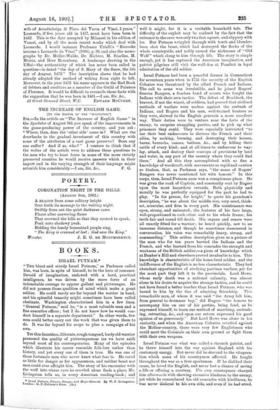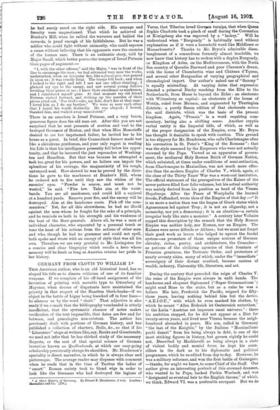BOOKS.
ISRAEL PUTNAM.* " THE blunt and sturdy Israel Putnam," as Parkman called him, was born, in spite of himself, to be the hero of romance. Devoid of imagination, endowed with a hard, practical intelligence, he was driven by the mere force of an indomitable courage to appear gallant and picturesque. He did not possess those qualities of mind which make a great soldier. He could rarely see far beyond the matter in hand, and his splendid tenacity might sometimes have been called obstinate. Washington characterised him in a few lines. " General Putnam," said he, " is a most valuable man and a fine executive officer ; but I do not know bow he would con- duct himself in a separate department." In other words, few men could better carry out the work that was given them to do. It was far beyond his scope to plan a campaign of his own.
Yet this dauntless, illiterate, rough-tongued, burly old warrior possessed the quality of picturesqueness (as we have said) beyond most of his contemporaries. Many of the episodes which illustrate his career resemble folk-lore rather than history, and yet every one of them is true. He was one of those fortunate men who never knew what fear is. He cared as little for danger as for appearances, and neither beast nor man could ever airtight him. The story of his encounter with the wolf into whose cave he crawled alone finds a place, Mr. Livingston tells us, in every American reading-book ; and
• Israel Putnam, Pioneer, Ranger, and Major-General. By W. P. Livingston. London: G. I'. Putnam's Sous. EGLI well it might, for it is a veritable household tale. The difficulty of the exploit may be realised by the fact that the entrance to the cave was only two feet square, and slippery with ice. But Putnam wriggled through with torch and blunder- buss, shot the beast, which had destroyed the flocks of the whole countryside, and nobly earned the nickname of " Old Wolf " which clung to him through life. The story is simple enough, yet it has captured the American imagination, and patriot pilgrims still visit the wolf-den at Pomfret in loyal admiration of the old soldier.
Israel Putnam had been a peaceful farmer in Connecticut for seventeen years when in 1755 the security of the English Colonies was threatened by the allied French and Indians. The call to arms was irresistible, and he joined Rogers' famous Rangers, a fearless band of scouts who fought the Indians with their own tactics. The defeat of Braddock, the bravest, if not the wisest, of soldiers, had proved that civilised methods of warfare were useless against the ambush of Indians, and Rogers and his men, well-trained bunters as they were, showed to the English generals a more excellent way. Their duties were to venture near the forts of the enemy, to surprise straggling parties, and to pick up what prisoners they could. They were especially instructed "to use their best endeavours to distress the French and their allies, by sacking, burning, and destroying their houses, barns, barracks, canoes, battoes, &c., and by killing their cattle of every kind; and at all times to endeavour to way- lay, attack, and destroy their convoys of provisions by land and water, in any part of the country where they could find them." And all this they accomplished with so fine a knowledge of woodcraft, with movements so rapid and caution so tireless, that, as Parkman says, " the name of Rogers' Rangers was never mentioned but with honour." In this corps, then, Israel Putnam soon won a conspicuous plat*. He was given the rank of Captain, and constantly sent by Rogers upon the most hazardous errands. Both physically and morally he was perfectly equipped for the part he had to play. " In his person, for height," to quote his grandson's description, " he was about the middle size, very erect, thick- set, muscular, and firm in every part. His countenance was open, strong, and animated ; the features of his face large, well-proportioned to each other and to his whole frame; his teeth fair and sound till death. His organs and senses were all exactly fitted for a warrior ; he heard quickly, saw to an immense distance, and though he sometimes stammered in conversation, his voice was remarkably heavy, strong, and commanding." This artless description gives us a picture of the man who for ten years harried the Indians and the French, and who learned from his comrades the strength and weakness of the British soldier,—a piece of knowledge which at Bunker's Hill and elsewhere proved invaluable to him. This knowledge is characteristic of the home-bred soldier, and the indifference of the English is no less characteristic. They had abundant opportunities of studying partisan warfare, yet for the most part they left it to the provincials. Lord Howe, whose early death was a national calamity, was almost alone in his desire to acquire the strange tactics, and he could not have found a better teacher than Israel Putnam, who was bound to him by the ties of admiring friendship. This remarkable man, of whom it was said " the Army felt him, from general to drummer boy," did Rogers "the honour to accompany him on one of his parties, being fond, as he expressed himself, to learn our method of marching, ambush- ing, retreating, &c., and upon our return expressed his good opinion of us generously." But Lord Howe was alone in his curiosity, and when the American Colonies revolted against the Mother-country, there were very few Englishmen who could meet the Colonials on their own ground or fight them with their own weapons.
Israel Putnam was what was called a staunch patriot, and he threw himself into the war against England with his customary energy. But never did he descend to the vitupera- tion which some of his countrymen affected. He fought throughout the war as a true sportsman. If be disliked their cause, he loved the English, and never lost a chance of saving a life or offering a courtesy. His own countrymen charged him afterwards with showing excessive kindness to the enemy, yet while he remembered his old comrades with kindliness, he was never disloyal to his own side, and even if he had erred.
he had surely erred on the right side. His courage and ferocity were unquestioned. That which he achieved at Bunker's Hill, when he rallied the waverers and bullied the
cowards, is proof enough of his faithfulness. But he was a soldier who could fight without animosity, who could espouse a cause without believing that his opponents were the enemies of the human race. There is an authentic story, told by Major Small, which better proves the temper of Israel Putnam than pages of argument :—
"I, with the other officers," said the Major, "was in front of the line to encourage the men ; we had advanced very near the works, undisturbed, when an irregular fire, like a feu-de-joie, was poured in upon us ; it was cruelly fatal. The troops fell back ; and when I looked to the right and left I saw not one officer standing ; I glanced my eye to the enemy, and saw several young fellows levelling their pieces at me ; I knew their excellence as marksmen, and I considered myself gone. At that moment my old friend Putnam rushed forward, and striking up the muzzles of their pieces cried out, 'For God's sake, my lads, don't fire at that man ! I loved him as I do my brother.' We were so near each other that I heard his words distinctly. He was obeyed ; I bowed, thanked him, and walked away unmolested."
There in an anecdote is Israel Putnam, and a very brave, generous figure does the old man cut. After this you are not surprised that he sent presents of mutton and veal to the besieged Governor of Boston, and that when Miss Moncrieffe desired to see her imprisoned father, he invited her to his house as a guest. In brief, this Connecticut farmer made war like a chivalrous gentleman, and your only regret in reading his Life is that his intelligence presently fell below his oppor- tunity, and that he incurred the just reproaches of Washing- ton and Hamilton. But that was because he attempted a task too great for his powers, and no failure can impair the splendour of his courage, the magnanimity of his rough, untutored soul. How shrewd he was he proved by the direc-
tions he gave to the marksmen at Bunker's Hill, whom he ordered not to fire until they saw the whites of the
enemies' eyes. " Powder is scarce, and must not be wasted," he said. "Fire low. Take aim at the waist- bands. You are all marksmen, and could kill a squirrel at a hundred yards. Reserve your fire, and the enemy will be destroyed. Aim at the handsome coats. Pick off the com- manders." Yet, for all this shrewdness, he had no illwill against the men whom he fought for the sake of a principle, and he reminds us both in his strength and his weakness of the best of the Boer generals. Above all, he was a man of individual character, who separated by a personal touch or tone the least of his actions from the actions of other men and who, though he had no grammar and could not spell, both spoke and wrote with an energy of style that was all his own. Therefore we are very grateful to Mr. Livingston for a concise and clear biography which recalls a hero whose memory will be fresh as long as America retains her pride in her history.



































 Previous page
Previous page